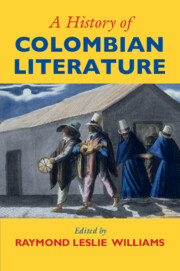Book contents
- Frontmatter
- Contents
- Notes on contributors
- Preface
- Introduction
- PART I LITERATURE AND SOCIETY IN COLOMBIA
- PART II COLOMBIAN CULTURE AND SOCIETY IN REGIONAL CONTEXTS
- 10 Literature, culture, and society of the Magdalena River
- 11 The highland region as seen by an outsider from the inside and an insider from the outside
- 12 Racial fictions: constructing whiteness in nineteenth-century Colombian literature
- 13 Literature and culture in Antioquia: between stories and accounts
- 14 Colombian marginalized literatures
- PART III BEYOND THE BOUNDARIES
- AFTERWORDS
- Index
- References
13 - Literature and culture in Antioquia: between stories and accounts
from PART II - COLOMBIAN CULTURE AND SOCIETY IN REGIONAL CONTEXTS
Published online by Cambridge University Press: 05 June 2016
- Frontmatter
- Contents
- Notes on contributors
- Preface
- Introduction
- PART I LITERATURE AND SOCIETY IN COLOMBIA
- PART II COLOMBIAN CULTURE AND SOCIETY IN REGIONAL CONTEXTS
- 10 Literature, culture, and society of the Magdalena River
- 11 The highland region as seen by an outsider from the inside and an insider from the outside
- 12 Racial fictions: constructing whiteness in nineteenth-century Colombian literature
- 13 Literature and culture in Antioquia: between stories and accounts
- 14 Colombian marginalized literatures
- PART III BEYOND THE BOUNDARIES
- AFTERWORDS
- Index
- References
Summary
Colombia is a fragmented country, difficult to understand as a homogeneous whole. Each natural region into which it is divided has its own characteristics. One of these regions is Antioquia, where, for various reasons, a distinct group of people exist with marked differences from the rest of the population. Anthropologists, historians, sociologists, and economists have written countless interpretations of El caso antioqueño (The Antioquia Case). One of the pioneering works is by the American geographer James Parsons, who, in 1948, as part of his PhD written at the University of Berkeley, California, wrote the classic study La colonización antioqueña en el occidente colombiano (The Antioquian Colonization in Western Colombia). In the words of the researcher Alejandro Reyes, in this book the American geographer “se concentró en el problema de explicar cómo un grupo regional se distinguió y acumuló tantos recursos morales e intelectuales, cómo su cultura perfiló una ética basada en el trabajo familiar y el ahorro que permitieron hacer de Antioquia la región industrial y emprendedora que la distingue en Colombia” (focused on the problem of explaining how a regional group located and accumulated so many moral and intellectual resources, and how its culture outlined an ethic based on family labor and savings that led to the making of Antioquia as the industrial and entrepreneurial region that stands out in Colombia) (Reyes 1986:199). This chapter proposes to provide a description of the cultural evolution of this region's society during the second half of the nineteenth century and the early twentieth century.
Antioquia was different between the Colonial period and the years following independence from the Spanish crown in 1819. In fact, all written reports from the colonial officials in the late eighteenth century speak of an underdeveloped region, with a population immersed in poverty, isolated from the rest of the colonial territory by a lack of roads, as well as by a lack of entrepreneurial initiative. A century later, the perception of Antioquia was completely different, and in the collective imaginary the antioqueño became a synonym for strength, entrepreneurship, and economic prosperity.
One of the reasons for this profound transformation is connected to gold. Early Spanish settlers decided to establish themselves in this isolated territory as a result of the existence of precious metals, but throughout the Colonial period its exploitation was performed with artisanal and rudimentary methods in the alluvial beds of the insalubrious lowlands.
- Type
- Chapter
- Information
- A History of Colombian Literature , pp. 269 - 286Publisher: Cambridge University PressPrint publication year: 2016



